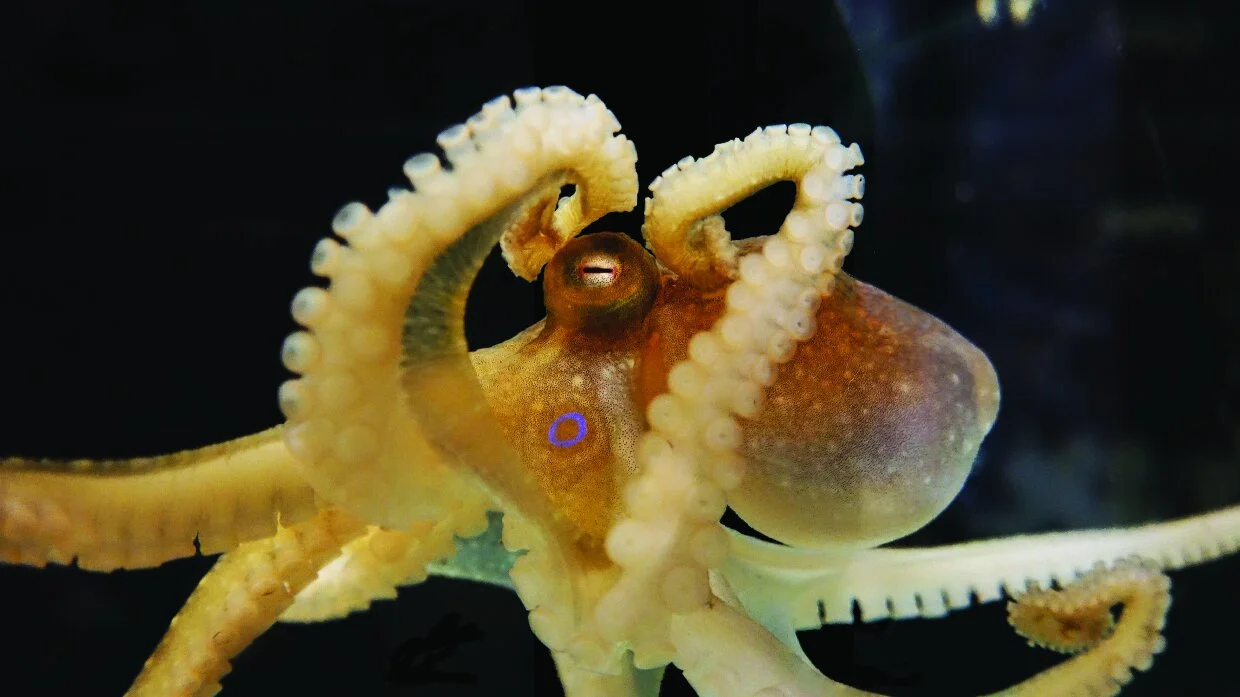ARE OCTOPUSES MORE HUMAN THAN WE ARE?
RESEARCHERS FIND A HIGH NUMBER OF THE GENES THAT SUPPOSEDLY SEPARATE US FROM OTHER ANIMALS IN AN OCTOPUS
The California two spot octopus, whose genome was sequenced for the first time last year. Photo credit: Judit Pungor.
We’ve all heard stories of scientists turning up amazing discoveries in the most unexpected places. In fact, sometimes it seems like most of the greatest scientific discoveries happened completely by accident. This is largely because not knowing the answer makes it hard for scientists to ask the right questions. This story is no exception, because when a group of scientists (including former Stanford Ph.D. student Judit Pungor) decided to take on the mighty task of sequencing the entire genome of the California two-spot octopus, they did it hoping to learn more about these strange animals and maybe figure out which genes make them so different from other mollusks. They certainly didn’t expect to learn that octopus and humans have something very important in common.
So how is an octopus like a human? No, this is not a Lewis Carroll riddle. Even though it may seem like octopuses could not be any more different from us, our genes share one major thing that no one has seen in any other animal. The answer also sounds like something out of Alice and Wonderland: protocadherins. Or rather, lots of protocadherins.
Trust me, I promise that is not a word I just made up. Protocadherins are proteins that help nerve cells connect to each other by labeling each individual nerve. They are like name tags for the nerves’ first day of school. How can the nerves know who they are supposed to sit next to if no one is wearing name tags? Thanks to these proteins, nerves are able to tell each other apart while they are developing; that way they know which nerves they should or should not connect to. While this in and of itself may not seem like such a big deal, some scientists believe that it is because we have such a large number of these proteins that we have been able to develop our complex nervous system and do all the amazing things we humans have been able to do. Humans have 71 genes for these name tag proteins, far more than any other animal whose genome has been studied. That is, until now.
It turns out octopus don’t just have a lot of genes for protocadherins, they have a whopping 168. This is especially impressive when you consider that some of their closest relatives (such as oysters) have only 17-25. Octopuses aren’t competing with our number of protocadherins; they’ve smoked us. So what does this mean for the octopus? What does this mean for us? Have human beings been dethroned as the planet’s most intelligent species? Is it time to acknowledge octopus as our marine overlords?
Well, not exactly.
When it comes to these protocadherins, “Not a whole lot is known about their specific way of functioning,” said Judit Pungor, who received her Ph.D. at Stanford University’s Hopkins Marine Station before she began working on this study. Pungor explains that although we know that protocadherins are used as nerve cell name tags, we don’t really know how they work or what else they do. This makes it impossible to know what a presence (or lack) of them might tell us about an animal’s intelligence.
In fact, the high number of protocadherins in octopus might actually have more to do with the differences between their nervous system and ours, not the similarities. Our nerves are wrapped in some insulating stuff called myelin, which lets signals travel much further and faster along the nerve than they could without it. This allows us to have really long nerve cells that can still carry signals quickly to and from the brain. But octopuses on the other hand (or should I say arm) do not have myelin on their nerve cells, and so their nerves just can’t send signals over long distances.
“Instead of having a long telephone wire, you need to string together a lot of tin can phones,” Pungor explained. When you need more small nerves to carry information the same distance, you need more name tags to correctly identify and wire them together.
But even this might not tell the whole story. When the research team compared the protocadherins in octopus to those that were previously found in squid, they found some pretty big differences in their genes. This is surprising because octopus and squid are very closely related and the setup of their nervous systems is similar. Yet the protocadherins in octopus were so different than those found in squid that the research team concluded they must have evolved completely separately. Curiouser and curiouser!
The goal of science is to find answers, but often in trying to find these answers we come up with even more questions. The researchers who sequenced the octopus genome wanted to find out what genes might make octopus different from most every other animal on the planet. But in doing so they also uncovered a ton of new questions about octopus, about protocadherins, and about what it means to be human.
REFERENCES
Albertin, C.B., Simakov, O., Mitros, T., Wang, Z.Y., Pungor, J.R., Edsinger-Gonzales, E., Brenner, S., Ragsdale, C.W., and Rokhsar, D.S. (2015). The octopus genome and the evolution of cephalopod neural and morphological novelties. Nature. 524, 220-+.

